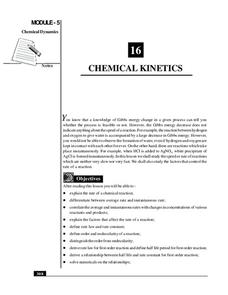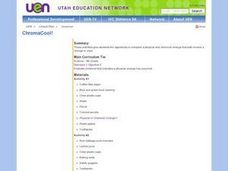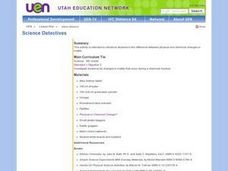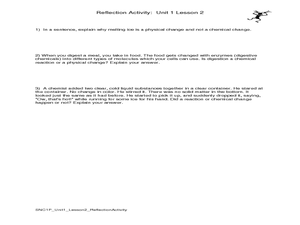Curated OER
Follow Up Questions Lab 1-Chemical Reactions
In this chemical reactions worksheet, learners answer follow up questions to a lab where they were observing chemical changes in reactions after mixing products such as hydrochloric acid and sodium bicarbonate. They answer six questions...
Curated OER
Investigating Chemical and Physical Changes
Young scholars explore physical and chemical changes by looking at how different powders react to a variety of substances. They observe and identify the difference between physical and chemical change using a mystery powder.
Curated OER
Chemquest: Physical Changes or Chemical Reactions
Students explore physical and chemical changes. For this chemistry lesson plan, students will go outside to observe changes seen in nature. Students will then work in the lab to identify changes at different stations prior to doing a...
Curated OER
Rusting, Burning and Oxygen
In this rusting, burning and oxygen instructional activity, students read about chemical reactions and are given diagrams of a rusting bicycle, a burning candle, and a variety of chemical changes. Students make observations and explain...
American Chemical Society
Color Changes with Acids and Bases
Getting back to the beginning of the unit, learners use reactions with red cabbage juice to determine if solutions are acidic, neutral, or basic. This is a straightforward and classic investigation, but what you will appreciate is the...
Chymist
Writing Chemical Equations
Communicate chemistry clearly with a concise guide to writing chemical equations. It covers everything from the parts of a chemical equation to the different types of reactions that budding chemists may encounter.
It's About Time
Chemical Names and Formulas
Abracadabra! Provide your class with the tools to perform a chemical "magic show" as they predict the charges of various ions, determine ionic compound formulas, and make observations to determine when a chemical reaction between two...
Curated OER
Chemical Change
Fifth graders watch a demonstration in which a balloon is inflated using the gas created by combining vinegar and baking soda. Then, in groups, they combine various assigned substances and watch and record the results.
Cornell University
Unknown Powders
Create a little scientific magic within your classroom! Learners mix powders and liquids and identify chemical reactions. Based on the reactions, individuals determine the identity of various powders.
National Institute of Open Schooling
Chemical Kinetics
Not all chemical reactions happen at the same rate because some, like explosions, occur quickly and some, like rusting, occur over time. Here, learners explore chemical reactions and their rates in the 16th lesson of 36. Through readings...
Curated OER
State Change
Eighth graders explore the physical change of matter. As a class, they discuss their favorite super hero and determine if the hero undergoes a physical or chemical change. Students examine the change of state and phase change. In groups,...
Curated OER
The Heat is On!
Fifth graders investigate evidence for changes in matter that occur during a chemical reaction.
Curated OER
2002 U.S. National Chemistry Olympiad National Exam - Part I
As to be expected from the American Chemical Society Olympiad Examinations Task Force, this 60-question test tops the charts in terms of excellence. It consists entirely of multiple choice questions designed to assess a year's worth of...
American Chemical Society
From Gas to Liquid to Solid
From gas to liquid condensation to solid frost, water undergoes phase changes before students' eyes! Using ice, salt, water, and a metal can, they set up an investigation that can be used in a physical science setting, or as part of a...
Curated OER
ChromaCool!
Fifth graders watch a video about physical and chemical changes. In groups, they participate in a variety of activities involving color. They write their observations in a journal. To end the lesson, they use a checklist to classify...
Curated OER
Science Detectives
Fifth graders examine the differences between chemical and physical changes. As a class, they are read a scenerio and determine whether it was deliberate act or not. In groups, they observe the changes of an alka-seltzer tablet and...
Curated OER
Kitchen Chemistry
Fifth graders examine both physical and chemical changes, and how to identify the difference between the two. They observe the changes that occur in butter when it is exposed to heat and cold, heat energy. In their notebooks, they write...
Curated OER
Hidden Science in Colonial Living
Fifth graders evaluate evidence that indicates a physical change has occurred. In this colonial living lesson, 5th graders explore the science involved in the making of items used in colonial life, such as, bread, butter, soap, candles,...
Curated OER
Cool Chemistry- DIY pH Indicator
Students study the differences between an acid and a base. In this pH lesson students view a demonstration then test chemicals in groups.
Curated OER
Stiochiometry: Quantifying Changes in the Environment
Students examine stoichiometry. In this chemical reaction and mole lesson plan, students complete an experiment based on readiness levels to explore that changes are quantified in chemical reactions.
Curated OER
Understanding Chemical Equations
In this chemical equations worksheet, students identify the reactants and the products, state what phase each is in, and state the mole ratios of all the products and reactants. Students complete 10 problems.
American Chemical Society
Energy Foundations
Only 10 percent of an incandescent bulb's energy is used to create light; the remaining 90 percent is heat. In the unit of activities, young chemists examine energy through hands-on activities, videos, discussions, and readings. Scholars...
Curated OER
Chemical Changes
Students explore chemical changes. in this activity about the properties of chemical changes, students do experiments, observe, and record results. Students complete four experiments in order to observe chemical changes. In each...
Curated OER
Physical and Chemical Changes
Students differentiate physical and chemical changes. In this chemistry lesson, students identify five indicators that a chemical change took place. They complete a reflection journal at the end of the activity.

























